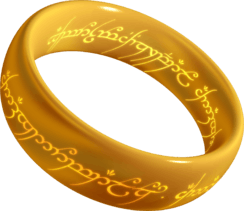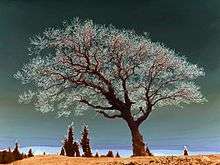
In Aragorn Elessar the dignity of the kings of old was renewed.

He was elven-wise, and there was a light in his eyes that when they were kindled few could endure.
I gave Hope to the Dúnedain, I have kept no hope for myself.

Let us not be overthrown at the final test, who of old renounced the Shadow and the Ring. In sorrow we must go, but not in despair.

Arwen went forth from the House, and the light of her eyes was quenched, and it seemed to her people that she had become cold and grey as nightfall in winter that comes without a star.
Yet things might have gone far otherwise and far worse.
This page is for quotations from the Appendices of Lord of the Rings by J. R. R. Tolkien
- Fëanor was the greatest of the Eldar in arts and lore, but also the proudest and most selfwilled. He wrought the Three Jewels, the Silmarilli, and filled them with the radiance of the Two Trees, Telperion and Laurelin, that gave light to the land of the Valar.
- Aragorn indeed lived to be two hundred and ten years old, longer than any of his line since King Arvegil; but in Aragorn Elessar the dignity of the kings of old was renewed.
- Each new Steward indeed took office with the oath "to hold rod and rule in the name of the king, until he shall return." But these soon became words of ritual little heeded, for the Stewards exercised all the power of the kings. Yet many in Gondor still believed that a king would indeed return in some time to come; and some remembered the ancient line of the North, which it was rumoured still lived on in the shadows. But against such thoughts the Ruling Stewards hardened their hearts.
Nonetheless the Stewards never sat on the ancient throne; and they wore no crown, and held no sceptre. They bore a white rod only as the token of their office; and their banner was white without charge; but the royal banner had been sable, upon which was displayed a white tree in blossom beneath seven stars.'
- Then Aragorn, being now the Heir of Isildur, was taken with his mother to dwell in the house of Elrond; and Elrond took the place of his father and came to love him as a son of his own. But he was called Estel, that is "Hope", and his true name and lineage were kept secret at the bidding of Elrond; for the Wise then knew that the Enemy was seeking to discover the Heir of Isildur, if any remained upon earth.
- Elrond saw many things and read many hearts. One day, therefore, before the fall of the year he called Aragorn to his chamber, and he said: "Aragorn, Arathorn's son, Lord of the Dúnedain, listen to me! A great doom awaits you, either to rise above the height of all your fathers since the days of Elendil, or to fall into darkness with all that is left of your kin. Many years of trial lie before you. You shall neither have wife, nor bind any woman to you in troth, until your time comes and you are found worthy of it."
- Then Aragorn took leave lovingly of Elrond; and the next day he said farewell to his mother, and to the house of Elrond, and to Arwen, and he went out into the wild. For nearly thirty years he laboured in the cause against Sauron; and he became a friend of Gandalf the Wise, from whom he gained much wisdom. With him he made many perilous journeys, but as the years wore on he went more often alone. His ways were hard and long, and he became somewhat grim to look upon, unless he chanced to smile; and yet he seemed to Men worthy of honour, as a king that is in exile, when he did not hide his true shape. For he went in many guises, and won renown under many names.
- Thus he became at last the most hardy of living Men, skilled in their crafts and lore, and was yet more than they; for he was elven-wise, and there was a light in his eyes that when they were kindled few could endure. His face was sad and stem because of the doom that was laid on him, and yet hope dwelt ever in the depths of his heart, from which mirth would arise at times like a spring from the rock.
- Onen i-Estel Edain, ú-chebin estel anim
(I gave Hope to the Dúnedain, I have kept no hope for myself.)
In Appendix A of the novel, this is said by Gilraen; in the movie adaptation of The Return of the King it is statement made by Elrond (the first part) and Aragorn (the second, in reply).
- We have heard tell that Legolas took Gimli Glóin's son with him because of their great friendship, greater than any that has been between Elf and Dwarf. If this is true, then it is strange indeed: that a Dwarf should be willing to leave Middle-earth for any love, or that the Eldar should receive him, or that the Lords of the West should permit it. But it is said that Gimli went also out of desire to see again the beauty of Galadriel; and it may be that she, being mighty among the Eldar, obtained this grace for him. More cannot be said of this matter.
- "Lady Undómiel," said Aragorn, "the hour is indeed hard, yet it was made even in that day when we met under the white birches in the garden of Elrond, where none now walk. And on the hill of Cerin Amroth when we forsook both the Shadow and the Twilight this doom we accepted. Take counsel with yourself, beloved, and ask whether you would indeed have me wait until I wither and fall from my high seat unmanned and witless. Nay, lady, I am the last of the Númenoreans and the latest King of the Elder Days; and to me has been given not only a span thrice that of Men of Middle-earth, but also the grace to go at my will, and give back the gift. Now, therefore, I will sleep.
"I speak no comfort to you, for there is no comfort for such pain within the circles of the world. The uttermost choice is before you: to repent and go to the Havens and bear away into the West the memory of our days together that shall there be evergreen but never more than a memory; or else to abide the Doom of Men."
"Nay, dear lord," she said, "that choice is long over. There is now no ship to bear me hence, and I must indeed abide the Doom of Men, whether I will or nill: the loss and the silence. But I say to you, King of the Númenoreans, not till now have I understood the tale of your people and their fall. As wicked fools I scorned them, but I pity them at last. For if this is indeed, as the Eldar say, the gift of the One to Men, it is bitter to receive."
"So it seems," he said. "But let us not be overthrown at the final test, who of old renounced the Shadow and the Ring. In sorrow we must go, but not in despair. Behold! we are not bound forever in the circles of the world, and beyond them is more than memory, Farewell!"
- "Estel, Estel!" she cried, and with that even as he took her hand and kissed it, he fell into sleep. Then a great beauty was revealed in him, so that all who after came there looked on him with wonder; for they saw the grace of his youth, and the valor of his manhood, and the wisdom and majesty of his age were all blended together. And long there he lay, an image of the splendour of the Kings of Men in glory undimmed before the breaking of the world.
But Arwen went forth from the House, and the light of her eyes was quenched, and it seemed to her people that she had become cold and grey as nightfall in winter that comes without a star. Then she said farewell to Eldarion, and to her daughters, and to all whom she had loved; and she went out from the city of Minas Tirith and passed away to the land of Lórien, and dwelt there alone under the fading trees until winter came. Galadriel had passed away and Celeborn had also gone, and the land was silent.
There at last when the mallorn-leaves were falling, but spring had not yet come, she laid herself to rest upon Cerin Amroth; and there is her green grave, until the world is changed, and all the days of her life are utterly forgotten by the men that come after, and elanor and nimphredil bloom no more east of the sea.
- Yet things might have gone far otherwise and far worse. When you think of the Battle of Pelennor, do not forget the battles in Dale and the valor of Durin's Folk. Think of what might have been. Dragon-fire and savage swords in Eriador, night in Rivendell. There might be no Queen in Gondor. We might now hope to return from the victory here to ruin and ash. But that has been averted — because I met Thorin Oakenshield one evening on the edge of spring in Bree. A chance-meeting, as we say in Middle-earth.
External links
- HarperCollins: UK & Worldwide Publishers
- Houghton Mifflin: US Publisher
- Official Site of the Movie Trilogy
The first volume of Tolkien's greatly acclaimed epic was first published July 29, 1954, the second on November 11 of the same year, and the final volume on October 20, 1955.
This article is issued from
Wikiquote.
The text is licensed under Creative
Commons - Attribution - Sharealike.
Additional terms may apply for the media files.